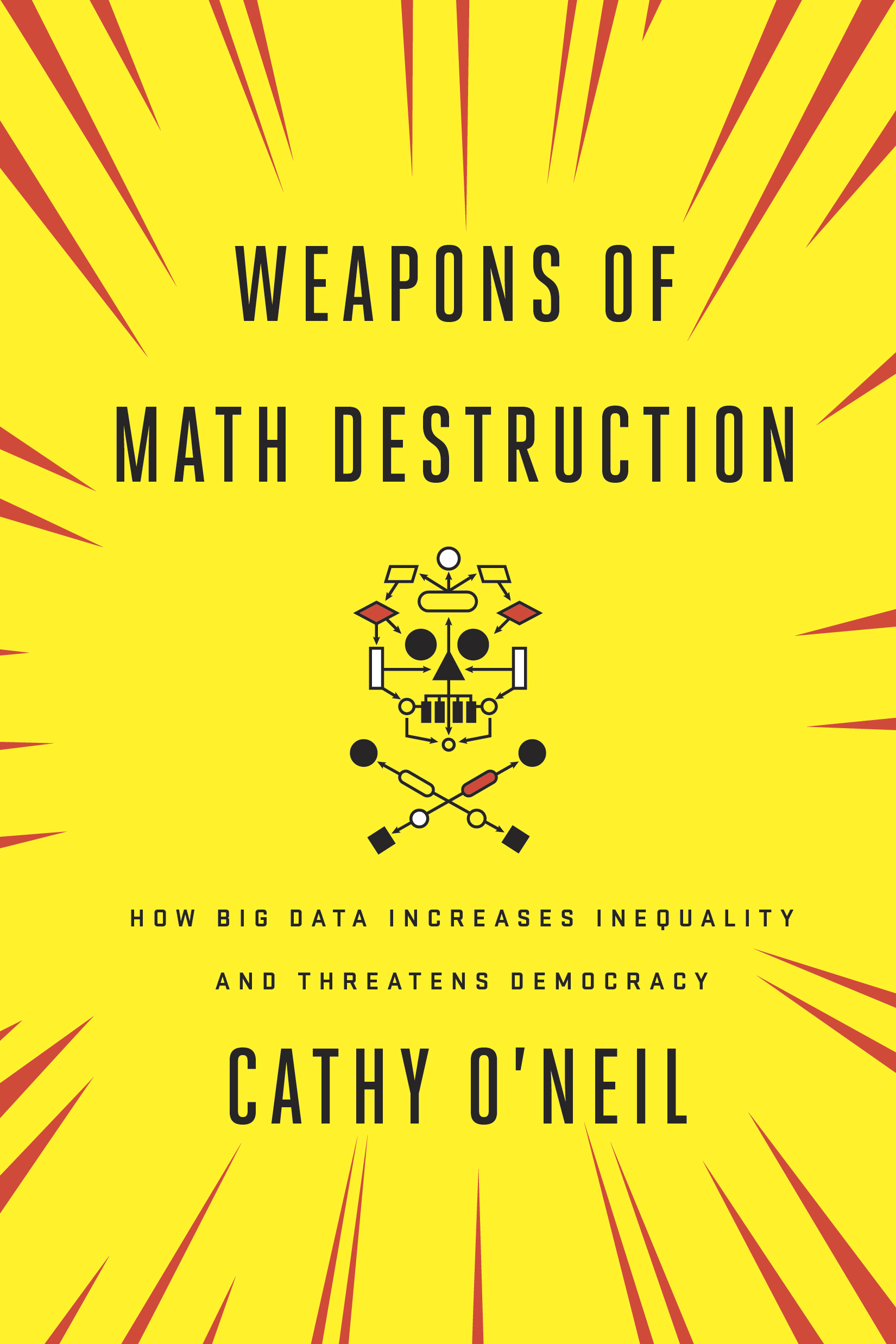
Weapons of Math Destruction: How Big Data increases Inequality and Threatens Democracy is a New York Times Bestseller and is on the National Book Award longlist. It is an eyeopening look at the big data work we live in with far-reaching implications about what the huge quantities of numbers being continuously collected in most social structures today mean. Not surprisingly, her book has received a great deal of attention. You can listen to an interview on NPR, read reviews in Scientific American, New York Times, and more. I was honored to speak with Cathy about her ideas, followed by an email interview. Read on to learn about her perspectives, particularly as they relate to learning and teaching math, her views about being an “everyday mathematician”, and what her middle school math class would look like, if she taught one.
The stakes are indeed so very high when it comes to all of us (and our students and children) being able to be math literate enough to ask questions of algorithms and institutions, to push for accountability. “I’m no good at math” is not an allowable reason not to do this. We all need to see the relationship between being literate (quantitatively) and democracy, and do all we can to make sure that math is seen as relevant, important and accessible to every citizen from the early years on. Please share this post with every math teacher, math lover, and math phobe you know!!
1. The title of your book sounds quite ominous. Is math an ominous tool in today’s world, in your opinion?
What? No. Math is awesome and beautiful and deserves our respect and trust. What we need to watch out for is people manipulating our mathematical trust by projecting it onto automated systems, that have very little to do with math and a whole lot to do with the agenda of whoever built them.
So, if I build an automated system to score people’s job performance, the results should not be accepted as indisputable just because I used a mathematical formula at some point in the process. Rather, I should be forced to give abundant evidence that my scoring system is synced with some generally understood and acceptable way of scoring people at their job. People should be able to argue that the formula doesn’t apply to them, or that the data was incorrect, or any other of a host of issues. The automated system should be held accountable.
So, to answer your question, the ominous tendencies I wrote about have to do with the weaponization of mathematics, not mathematics itself.
2. Personal anecdotes about math learning/teaching episodes that have influenced you negatively or positively?
I’ve pretty much always loved math and I’ve always hated competition. I’m kind of an old-fashioned hippie when it comes to the way I think about talking about and sharing math. In my view, mathematics is beautiful, like art, and the people who are lucky enough to think about it daily have a responsibility to make that beauty accessible whenever possible. I always loved teaching because there’d always be at least a few students who would really dig it, who would smile with pleasure when they understood something. That’s the best moment of a teacher’s day.
3. Why did you write your book?
I worked in a hedge fund during the crisis, and I didn’t like the way mathematicians were wielding mathematical lingo to confuse and take advantage of people. So I fled the field and refashioned myself a data scientist, but I saw the same exact nasty approach coming up time and time again. The difference was, whereas the world knew better about financial models by this time, they seemed to be swallowing the big data hype. I wanted to let people know that we need to be way more skeptical of algorithms, and that we needed to demand accountability, especially people who knew about math and should be behaving better. In short, we need to get ethics, to take responsibility for the effects we’re now having on the world with our clever machine learning toys. The choices we make that might seem arbitrary or benign can have deep and devastating repercussions, and we need to own it.
4. Ideas about how to move as a society towards higher levels of comfort when it comes to thinking, doing and learning math as part of our everyday life?
A lot of the success of the WMD’s I talk about in my book stem from people’s fear of math. They feel like that aren’t very good at math and aren’t sufficiently expert to push back. This starts very early in life, when someone in math class gets momentarily lost and then is forever intimidated by fancy mathematical notation they missed the definition for.
This is unfortunate, because notation is really supposed to help, not hurt. I think this issue is by far the most obvious problem we can address. Let students choose their own notation, and let it be whatever they want as long as they don’t choose things that already mean something like numerals or “+” or “=”. And, for the first 5 times you use a new piece of notation, make sure you write out longhand, or say, the thing that it stands for. Make the point constantly that there’s no point going forward if not everyone understand the notation, what’s being said. Math is hard enough without ambiguity.
I have always taught this way, especially when I teach at my favorite math camp, and I think it really empowers kids to ask dumb questions and feel comfortable with their own confusion, the two most important things about being an everyday mathematician.
5. If you taught middle school math, what would it look like in your classroom?
Oh, a lot of construction paper everywhere, lots of geometric art (possibly knitted or crocheted or both), a lot of silly made-up notation, lots of debates along the lines of whether 0.999999… is equal to 1, and if I could get to it, I’d convince everyone to download Euclidea, my favorite geometry app.
 About Cathy:
About Cathy:
Cathy O’Neil earned a Ph.D. in math from Harvard, was a postdoc at the MIT math department, and a professor at Barnard College where she published a number of research papers in arithmetic algebraic geometry. She then switched over to the private sector, working as a quant for the hedge fund D.E. Shaw in the middle of the credit crisis, and then for RiskMetrics, a risk software company that assesses risk for the holdings of hedge funds and banks. She left finance in 2011 and started working as a data scientist in the New York start-up scene, building models that predicted people’s purchases and clicks. She wrote Doing Data Science in 2013 and launched the Lede Program in Data Journalism at Columbia in 2014. She is a weekly guest on the Slate Money podcast and wrote the book Weapons of Math Destruction: how big data increases inequality and threatens democracy. She recently founded ORCAA, an algorithmic auditing company.
The post Weapons of Math Destruction by Cathy O’ Neil appeared first on talkSTEM.